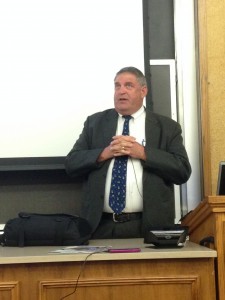
Richard B. Miller, a professor in the Family Life Department, spoke on the healing power of forgiveness at Education Week Thursday.
Miller has written several publications on marriage and family and made, “A happy marriage is the union of two good forgivers,” the central topic in his class.
Miller noted that forgiveness in a marriage is not a new concept; however, it could be a tall order. Miller stressed that his goal was to help give tools, concepts and new ideas to help make forgiving more manageable.
The two main categories of marital problems, Miller explained, are “piled up” minor infractions and major betrayals. The minor infractions may include being late for dinner and forgetting to pick up the kids from school. A pile-up of those minor issues may be bottled up inside and create major problems down the road. Major betrayals, such as affairs and pornography addiction, cause immediate confrontation. He stressed that these instances require forgiveness for a couple to persevere.
“Let go of the boneheaded things,” Miller said with regard to those minor issues. He said it is crucial to remember the eternal perspective, meaning as long as an individual and their spouse are on the right track, letting go of built-up anger over small things can help the couple draw closer to their celestial goals.
On the other hand, Miller explained that offenses that break covenants are a whole different issue. Infidelity, abuse and pornography are all examples of covenant-breaking offenses that cut deeply into emotions. Although forgiveness is still required of us in these instances, Miller expressed his understanding that it is a much more complicated process.
He also explained that trust is not part of forgiveness. They are two completely separate processes. Trust is what the offender does to earn it back and is not required of us through the forgiveness process.
Miller spent a great deal of time emphasizing the scriptural reference in D&C 64:8–10, where it states that “he that forgiveth not his brother his trespasses standeth condemned before the Lord.”
He explained that our ability to forgive should not be dependent on whether or not the offender has repented, because we are commanded to forgive unconditionally. The beauty of the Atonement is that we will be forgiven of our sins if we are able to forgive others, regardless of whether or not they repent.
More Education Week articles:
- Marleen S. Williams: Matters of the mind: Facing life’s trying tests
- Elder Bednar: To sweep the Earth as with a flood
- Julie Crockett: How your daughter can change the world with an engineering degree
- What brings you to Education Week?
- David B. Marsh: Helping those who struggle with doubt
- Steve A. Tersigni: The Word of Wisdom as God’s health plan
- Water main rupture temporarily shuts down Marriott Center during Education Week
- Tom Holmoe on the state of BYU athletics
- Roger K. Allen: How to talk to your children
- Randal A. Wright teaches how to live purposefully with self-discipline
- Education Week: A Week in Photos (Aug. 22, 2014)
- Education Week at a glance




